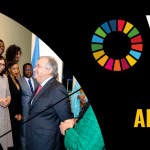In this exclusive interview on After School Africa, Daniel Waya Ddiba shares his experience on getting a scholarship and studying in Sweden as an African International student.
Daniel, from Uganda, Africa is a recipient of the Swedish institute scholarship. He is studying for Masters in Environmental Engineering and Sustainable infrastructure at KTH Royal Institute of technology Stockholm, Sweden. He is an international student blogger at KTH.
What you will learn from this interview
- Why Sweden is a preferred study destination for international students
- How Swedish Government awards 1,500 scholarships to international students every year.
- When and how to apply for Swedish university admissions and scholarship – requirements and procedures
- How to get admission without writing an English test like TOEFL or IELTS
- Is there really such thing as tuition free universities in Finland, Norway, Germany and Sweden? Get to know
- What is the cost of living in Sweden for an average African student? How can you offset this cost?
- How to easily adapt in the country as a foreign student
- Plus much more….
Table of Contents
ASA: It’s nice to have you here today, Daniel.
Daniel: Thank you Ikenna. I am also glad to be on this platform and to share my experiences with other students and young people that are aspiring to take their careers forward.
ASA: Why did you choose Sweden as your study destination, as an international student? And what’s so exciting about studying here?
Daniel: For me specifically, I think it goes back to my particular field of study. As you mentioned earlier, I’m doing a master’s program in environmental engineering. And some people might be aware of the fact that Sweden has quite a high international profile, as regards, its environmental initiatives. For example, households in Sweden recycle up to 99% of their waste, and in general, the average Swede is very environmental conscious.
So I knew that coming to Sweden to study on this particular program will give me an opportunity, not only to study in class, in lectures but I could also be studying when I am outside class, by meeting everyday people and finding out about the different initiatives that has been taken within the country to ensure that the environment is well taken care of. So that basically is the major reason why I chose to come to Sweden.
ASA: Let’s talk about Swedish institute scholarship. How did you get this scholarship?
Daniel: The Swedish institute gives scholarships to students from all over the world. And they have a program that runs every year. Application period starts around October every year up to early January. It is advertised nationwide. Of course the visibility of this is much more in countries where there is a Swedish embassy, or cross-cultural relationship between Sweden and that particular country.
So in my own country Uganda, Sweden has a lot of collaborations with the public universities in Uganda. There was a Swedish day celebration at my previous university, Makerere University, where they invited the Swedish Ambassador to Uganda. They displayed some of the research funding that Sweden has given to Uganda researchers. And this scholarship program was one of the things they talked about. So I got to know about it.
A story ran later in the newspapers and I was linked to the website where you could find more information. I went to this website. That was how I got to know more about the Swedish institute scholarship.
ASA: I believe there were a lot of students that applied for this scholarship. And few students were selected. So there has to be something about these students. What exactly would you point out that was the advantage you had towards getting this scholarship?
Daniel: Well, I could say they pretty much just liked me… Am kidding. Anyway, it’s quite a competitive process for applying to this scholarship. Like I mentioned, every year they give out scholarships to about 1500 students – at least that’s what I know. My particular year when I joined in 2014, they were giving scholarships to 1500 students from all around the world. So we had students from Africa, South America, Asia, Latin America and some students from Europe.
2 Stages for Applying for Swedish Admission and Scholarships
The application process is pretty much simple. I think it’s one of the easiest application procedures when you compare to other international scholarship programs. You have to get admitted into a Swedish university first of all. So there are two stages – the scholarship application is completely separate from the admission application. The Swedish institute will give you a scholarship only if you have gotten admitted into a university. The two are separate procedures.
Like I mentioned, Swedish universities open application every year around October and there is one website where you can apply to all universities in Sweden. It’s a very centralized system. You can apply for master’s programmes in all Swedish universities together.
They give you up to four choices of universities that you want to go to and programs to choose from. If you want, you can choose only one. But you can make up to four choices in other of priority.
The Admission Requirements
Then you submit some information; passport, transcript of previous studies and any other information necessary to support your application, depending on the university and the different requirement that they have for the different programs. For example, my particular programme only required that you send in a motivation letter, CV and then the transcript from your previous studies.
They also require that your transcripts should show certain prerequisite. For example if you are going to do a program, in engineering you need to show that you have done mathematics or physics. So my transcript could verify these particular requirements.
Language requirement: Do you need to write English test; TOEFL or IELTS if your previous study was taught in English?
Then language requirement. Because in Sweden, I think above 90% of masters programs in all universities in Sweden are taught in English. So you need to show proficiency in English language either by taking an international English language test like TOEFL, IELTS. Or if you have done bachelors studies in English and your transcript states that these particular program, the language of instruction was English, then you don’t have to do a test.
So in my case, I did high school studies in Uganda in English and also did my bachelors program in Uganda in English. So I didn’t need to write an English language test.
Like I mentioned the whole process is done online but then you need to send physical copies of these documents by mail or courier.
They will get back to you if you meet the requirement and if you’ve been successful. You will get to know from universityadmission.se; that’s the website that administers all the admission process. You get to know whether you have gotten a place at the university.
Applying for Swedish Institute Scholarship
As the process is going on, the Swedish institute opens its scholarship application process. You only have to submit, a CV and a motivational letter and of course, the list of programs that you have applied for on the admissions website. These two bodies are run by Swedish government, so they share information.
As soon as the results from the universityadmission.se portal are ready, the Swedish institute will know whether you have gotten a place. The university admission portal will let them know if they liked your CV, if your motivational statement was good and well written. Then they will let you know if they have given you a scholarship.
ASA: I want to believe there are other scholarships outside Swedish institute scholarship. Can you enlighten us on other opportunities, especially for African students?
3 categories of Scholarships
Daniel: There are basically three categories of scholarships. There are scholarships that are given by the Swedish governments or its different agencies. One thing that I should also add is that scholarships in Sweden usually depend upon the relationship between Sweden and the prospective student’s particular country. Different programs apply to different countries.
For example, in Uganda, there are also scholarship programs given by SIDA – Swedish International Development Cooperation Agency, mainly for PhD students. Whereas the Swedish institute which is also a government agency in Sweden gives scholarships to master’s students only. It’s usually important for a student to seek out information from the Swedish embassy in their country to find out any special requirements.
To think broadly, there are 3 categories like I said.
- From a Swedish government agency
- From a university. Some universities have large endowments and provide scholarships especially to students from Africa and other countries in the global south.
- Or there could be third party agencies that give scholarships. For example, I know that the Rotary Foundation gives scholarships and they invite applications from students all around the world. So if you get admission to a Swedish university, you might be able to apply for a rotary foundation scholarship.
Of course, information is easier to find for scholarships from the Swedish government because it is centralized. And if anyone wants to study in Sweden, they can always go to the website, www.studyinsweden.se, and that gives all the information you need; how to apply, universities, programs, scholarship opportunities available. You can follow them on twitter, Facebook and ask questions. They will always respond to you because they are very effective in giving feedback.
To give an example, at KTH royal institute of technology, there are certain scholarships given to international students. You can get 50% or 100% tuition waver. But it is also very competitive because you are competing with students all around the world. I also know that in Lund University which is in the southern part of Sweden, they offer International Excellence scholarships. And there are certain Ugandan students I know that have gotten that scholarship. It is administered by the university. So you apply for admission and also apply for the scholarship opportunity from the university’s website.
These are the 3 avenues that someone can pursue.
ASA: From what you said, I assume that there is relatively large number of African students studying in Sweden? Is that right?
Daniel: Yes. There is a large number. Sweden is very involved in bilateral relations with many African countries. So I know that at least for a Swedish institution, there are many Africa students on scholarship programs here. We usually interact and have meetings together and basically network. I’ve met students from Uganda, Kenya, Tanzania, Zambia, Sudan, Southern Sudan, Ethiopia, Egypt, Ghana, Nigeria to mention a few. So there is quite a large number of African students in universities spread all across the country.
ASA: Quite interesting. Now let’s talk about this. Online it’s not difficult to find information on tuition free universities; in Finland, Norway and mostly the Scandinavian countries. Is there really such thing as tuition free universities?
Daniel: Yes. Tuition free education, especially in tertiary level is something that is gaining more and more attention all around the world. I know that before 2011, master’s studies in Sweden were completely free of tuition to any student. As long as you applied, and you got admitted into a university, you could study for free in any university in Sweden. But then, in 2011, the parliament passed a law in Sweden where by that program ceased. [Mentioned on this article published in January 2011] Now it’s only available to European students or students within the free trade area of the European states.
But I have heard recently that, I think Germany and Finland are starting now to open these initiatives where certain universities in certain regions or provinces are completely free of tuition as long as you meet their admission requirements.
About Living Cost in Sweden
The other issue is living cost. Because as you know very well, living cost in Europe is drastically different from living cost in Africa or any other country. But if a person can cover their own living cost, then they could try some of these opportunities.
There are many people or blogs that have written about this (tuition free universities). I remember reading sometime back, a blog listed countries where you can study for free.
ASA: We’ve published about tuition free universities on afterschoolafrica.com.
Daniel: That’s great.
ASA: You talked about living expenses in Sweden. Can you give us a rough estimate of what it’s like, especially for a middle class African student?
Daniel: For a middle class African student. Living expenses depends on a person’s spending habits. The most important things to have are accommodation, transportation, food, course books and things like that.
When you apply for a visa to study in Sweden, they will ask you to prove that you can fund your stay to a tune of, at least 8000 Swedish Krona – about 969 US dollars, at the current rate.
So, roughly, if you can afford one thousand US dollars per month, you can fund your stay comfortably with accommodation, food, transportation and other things. But then this depends a lot on a person s spending habit. And this is pretty much the same if you study in a major city in Europe; talking about Sweden, Zurich, Marseille, Berlin, and London. Living expenses in capital of major cities are usually much higher than universities in the smaller cities.
For example, in Sweden, in Stockholm, the average accommodation rate will cost you up to 6,000 Swedish Krona. But in some cities, outside the center of Sweden, you can find accommodation going for as low as 2,000 Swedish kroner. So this depends a lot on where you are going to be studying.
But I would advise anyone who want to study in Sweden or any other European country. If you can get a scholarship program that will fund your living cost as well, that is the best option. If not, you have to be sure that you can fund your living cost.
ASA: How easy is it for foreign students to adapt? How receptive are the locals, from your perspective?
Daniel: Sweden itself is quite open. I’m studying in Stockholm, quite a cosmopolitan city with people from virtually every country in the world; many African students as well as expatriates and people that are working, or residing here from African. People from Asia, Arab, Latin America. It’s pretty easy to settle in if by nature you are an open person. You like meeting people of different culture. If it’s easy for you to adapt to any culture, you can pretty much survive.
The only problem will come with the coldness, being northern Europe, Scandinavian. We see the sun here, I think, only 2 or 3 months a year. So you should be well prepared for the coldness and the darkness during winter. But the people are friendly. You would not have any much of a problem getting around.
Almost everyone in Sweden speaks English. So it’s quite easy especially students that are coming from commonwealth or Anglo-countries, who are English speaking. But if you are not from Anglophone, that might be hard because you will have to learn the language.
I would also encourage anyone who is interested in coming to Sweden to be interested in learning the local language. Because it’s always easier to get around if you know the language of the people.
ASA: Would you say, it’s easy to learn the Swedish language?
Daniel: Yes and no. I’ve been here ten months. Some of my friends are very fluent. Personally I have picked up a couple phrases, here and there. May be I can ask for direction, I can ask for water, I can introduce myself. So I think it depends a lot on the interest of the person and their desire to learn the language and also their previous experience with learning languages. You find usually that people who already speak more than 2 or 3 languages; it’s easy for them to pick up another, than somebody who for their whole life has spoken only one language.
ASA: What is the biggest challenge for an international student, moving from Africa to go to Sweden to study?
Daniel: I think what has helped in my case, is that I am studying in a university that is pretty much internationalized. KTH has students from so many different countries around the world. There is a big international student community. So because we find ourselves, we are strangers, we are international students; we are all new to the place. So we are like “hey we might as well begin to make friends with each other”. And also there are many Africans living and working here.
So there are many communities you can engage in, associations of different countries and you can meet your fellow countrymen. I have met very many people here from Uganda, who has been living here for 3 to 4 decades. And so usually go out for gathering and these can help you to settle in. They show you where there is an African shop where you can buy some African food, Egusi soup and the like.
So I think that can help. I would encourage any African student to try to look out for these contacts; where there are different associations and communities of people from your country so that they can help you blend in with their experience. It will make it easier for you to settle in.
ASA: Finally, what is your advice for African students who want to study in Sweden probably on scholarship or fee bases?
Daniel: My final advice is that if you want to study in Sweden, go for it. Do not hesitate. You can find all the information you need online and if you have any question, you can interact with different people, even via social media networks. The very first place that you have to go is www.studyinsweden.se. That is the one stop center for all the information you need about what it is like to prepare for studies in Sweden.
It’s a very good country here. It’s very innovative. You will meet people from countries all around the world. Your world view will be broadened. You will meet people that will challenge your thinking. People that will challenge you with their ideas and you will also challenge them with your own.
I think it’s a very good opportunity that you can take advantage of if you are really interested. And there are programs covering virtually every aspect of studies in the world. From the humanities, social sciences to engineering, medicine, natural sciences, mention it. So you surely can find something that fits your mold.
ASA: Before I hang up… Tell us about your blog and how it fits in for students trying to come over to Sweden to study.
Daniel: Like I mentioned in the beginning I am studying at KTH Royal institute of Technology where there is a huge community of international students. So the university decided some time back that to help prospective international students who are interested in coming to Sweden or to KTH as an institution, it will be nice if they have international students who share what their experience in Sweden is like. So every year, they register about 8 international students that run blogs to basically write how life is like for an international student from multiple perspectives.
Since September last year (2014), I’ve been running a blog, which you can find at www.kth.se/blogs/daniel/ . On the blog you will find information about the experiences I’ve been going through both in school and outside school; social activities, my experiences, the things that have surprised me about Swedish societies…
There is also information for students that are interested in coming to study in Sweden; tips about the application process, possible scholarship opportunities; how to prepare for your studies; how to apply for a visa and all these information.
I write primarily for students who are interested in studying in KTH, because I am in Stockholm. I might not know how the situation is in other cities in Sweden but I have visited some, and also write my experiences there. So I believe it could be a good help for someone interested in coming here.
ASA: Thank you for sharing your experience. I hope we get around again and have more chat may be about moving back to Africa or settling down in Sweden.
Daniel: Definitely. I am also very glad that you gave me this opportunity to share my experience with the audience of afterschoolafrica.com. It’s a pleasure for me to share my experiences, in the hope that some other students might be inspired as well, and helped with their personal journey of career advancement.










